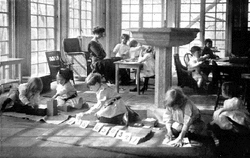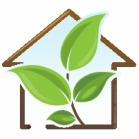Montessori Curriculum

Our Montessori curriculum composed of four areas: Practical Life Area, Sensorial Area, Math Area and Language Area. Under the Language area, there is also a culture extension, which give children knowledge about different cultures and societies as well as knowledge in Geography. For more detail information, please click on the name of each area.
Practical Life Area
At age three to six, they fulfill their tendency by organized activities. With repetition, they gain controls over their actions and learn practical life skills, which can be applied in their daily lives. Another important purpose for the practical life area is to help them develop their coordination in movements. These activities encourage the mind to focus on the small details for accomplishing complex tasks, which eventually bring orderly and refined movement. (To read more, click here)
Sensorial Area
From the birth of the child, until three years of age, every normal child will have numerous of impressions of the world stores in his brain. He has notions of softness, hardness, height, length, color, and other kind of sensorial experiences through unconscious absorbent mind. However, these impressions are stored without classification. Roughly starts from about three years old, children are going through a very particular moment towards the refinement of the senses. During this time, children are hypersensitive towards sensorial activities to further their knowledge of the world of senses and to categorize the impressions they stored previously.
(To read more, click here)
Mathematics Area
In order for a child to distinguish one from more than one, he needs the ability to abstract. Although the abstraction is hard for young child, it can be facilitated. The child’s ability to abstract is an individual process, which cannot occur unless a child has a certain level of understanding. Therefore the first requirement for it is to understand the concept. (To read more, click here)
Language Area
The Montessori language program is a systematic way for the child to experience language in the environment. This is very important for these young children, for they need to experience their environment in a meaningful way in order to understand and internalize it. The exercises we offer at this developmental stage are keys to the various aspects of language which open the door for ongoing explorations. Through observations of children, Dr. Montessori came to see the development of language in three distinct but related stages, which are spoken language, written language and reading. Each level requires a tremendous amount of internal and external efforts on behalf of the child. If done properly the combination of this work allows the child to fluent in self-expression.
(To read more, click here)
Practical Life Area
At age three to six, they fulfill their tendency by organized activities. With repetition, they gain controls over their actions and learn practical life skills, which can be applied in their daily lives. Another important purpose for the practical life area is to help them develop their coordination in movements. These activities encourage the mind to focus on the small details for accomplishing complex tasks, which eventually bring orderly and refined movement. (To read more, click here)
Sensorial Area
From the birth of the child, until three years of age, every normal child will have numerous of impressions of the world stores in his brain. He has notions of softness, hardness, height, length, color, and other kind of sensorial experiences through unconscious absorbent mind. However, these impressions are stored without classification. Roughly starts from about three years old, children are going through a very particular moment towards the refinement of the senses. During this time, children are hypersensitive towards sensorial activities to further their knowledge of the world of senses and to categorize the impressions they stored previously.
(To read more, click here)
Mathematics Area
In order for a child to distinguish one from more than one, he needs the ability to abstract. Although the abstraction is hard for young child, it can be facilitated. The child’s ability to abstract is an individual process, which cannot occur unless a child has a certain level of understanding. Therefore the first requirement for it is to understand the concept. (To read more, click here)
Language Area
The Montessori language program is a systematic way for the child to experience language in the environment. This is very important for these young children, for they need to experience their environment in a meaningful way in order to understand and internalize it. The exercises we offer at this developmental stage are keys to the various aspects of language which open the door for ongoing explorations. Through observations of children, Dr. Montessori came to see the development of language in three distinct but related stages, which are spoken language, written language and reading. Each level requires a tremendous amount of internal and external efforts on behalf of the child. If done properly the combination of this work allows the child to fluent in self-expression.
(To read more, click here)
